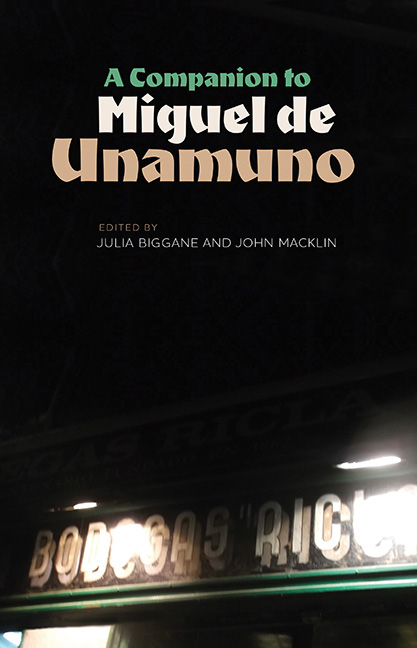3 - Exile 1924–1930: Essays, Narrative and Drama
Published online by Cambridge University Press: 21 May 2021
Summary
Miguel de Unamuno's exile from the Dictatorship of General Primo de Rivera forms a self-contained period made up of three distinct moments and places: his deportation to Fuerteventura (February-July 1924) and then his voluntary exile in Paris (July 1924-August 1925) and Hendaye (August 1925-February 1930). These six years, during which he would experience the privations and anxieties characteristic of exile, would place considerable strain not only on the man himself but also on the whole philosophical and intellectual worldview that he had built up over the previous decades. The resulting crisis starts to surface in his Fuerteventura and early Paris writings, including the 31 essays that make up the series entitled Alrededor del estilo (published between April and November 1924) and the chapters of La agonía del cristianismo (written between September and December 1924), and finally comes to a head in the original nucleus of Cómo se hace una novela, which was written in December 1924 and July 1925. The aftermath of the crisis can be seen in the Hendaye writings, including the three exile plays El Otro (written 1926), Sombras de sueño (written 1926) and El hermano Juan (written 1927–1929) and the poetic collection Cancionero (started in March 1928), but especially in the ‘Prólogo’, ‘Comentario’, ‘Continuación’ and other material that he added to the original nucleus of Cómo se hace una novela between May and July 1927. The aim of this chapter is to consider the nature of Unamuno's exile crisis as it is reflected above all in the three essayistic texts Alrededor del estilo, La agonía del cristianismo and Cómo se hace una novela. To do this, we first need briefly to consider the reasons for Unamuno's exile.
The intellectual banished: Unamuno's politics and philosophy before 1924
According to General Primo de Rivera, Unamuno was deported to Fuerteventura in February 1924 because of his insulting and incendiary attacks on the King, the Royal Family and the Dictator himself. In reality, the root cause of Unamuno's deportation lay in his long-term criticism of the virulently traditionalist strain of nationalism that he felt was coming to dominate the Restoration political regime.
- Type
- Chapter
- Information
- A Companion to Miguel de Unamuno , pp. 53 - 74Publisher: Boydell & BrewerPrint publication year: 2016

